- Home
- Franklin W. Dixon
The Castle Conundrum (Hardy Boys) Page 2
The Castle Conundrum (Hardy Boys) Read online
Page 2
Frank opened his mouth to mention the stick he had seen. Then he decided to hold off. This was a new place with a new bunch of people. He wanted to get a sense of it and them before he started making waves.
“I should warn you guys about one thing,” Kevin added as he set the van into motion again. “Whatever you see, whatever you hear, whatever the other kids try to tell you, keep this in mind—the chateau of Fréhel is not haunted.”
“Does that mean some people think it is?” Joe asked.
A muscle in Kevin’s cheek twitched. “It’s not,” he repeated in a louder voice. “It’s all a lot of nonsense. Pay no attention, you hear?”
They rounded a curve. The lane became a pair of rutted tracks with a line of thirsty-looking blades of grass growing between them. After a few dozen yards, the track ended at a flat, dusty field. A few vehicles were parked on the far side. They included a couple of cars, a battered motorcycle, and a small truck that looked as if someone had built it out of corrugated roofing. Beyond, a steep path snaked up the rugged slope to the clustered houses and the castle.
Kevin pulled up next to the truck and stopped.
“What is that contraption?” Joe asked, pointing to the truck.
Kevin grinned. “You are looking at a vintage CitroÎn camionnette,” he said. “It’s a collectors’ item. Top speed about forty miles an hour, with a tailwind. But it gets you where you’re going.”
They got out and Frank and Joe grabbed their backpacks. Kevin swung open the rear door of the van. “You want to give me a hand?” he asked, pointing to the cardboard boxes on the floor.
“Sure,” Frank replied. He got a grip on the nearest carton. It was heavy.
Kevin grabbed another carton. “Follow me.”
Frank glanced at Joe. Then he gave a meaningful look at the steep climb to the village. They were already carrying loaded backpacks. Was this some kind of test? Well, if so, they were not going to wimp out on their first day!
Joe took a box and followed after Kevin and Frank, who had stopped next to a wheeled platform about three feet square. A metal rail ran straight up the hillside toward the village.
“We’re not totally primitive here,” Kevin said, smiling. “This lift is our lifeline. If we had to carry all our supplies up the hill on foot, who’d have energy left for our real work?”
Kevin set his carton on the platform. Frank and Joe did the same. “Can it handle our packs, too?” Joe asked.
“Sure,” Kevin replied. “Put ’em on.” He bent down, opened the door of a control panel, and flipped a switch. The platform moved silently up the hill. Frank noticed a counterweight gliding down the hill at the same pace. He realized they must be linked by a cable.
“Neat,” Frank said.
“Designed and built by our TVI members,” Kevin told him. “The motor is up at the top. It runs off a solar panel. One thing we have plenty of around here is sunlight!”
Kevin started up the path. Frank touched Joe’s arm and motioned with his head for them to fall back a little. In an undertone, he told Joe about the suspicious stick and his impression that there had been something stretched across the lane.
“You mean, right before that rock almost hit us?” Joe demanded. “A booby trap!”
“It wouldn’t surprise me,” Frank said. “I’d like a look around where it happened. I wonder how we can manage that.”
By now Kevin was well ahead of them. He glanced back, as if wondering what was holding them up. Frank and Joe started walking faster. The higher they went, the more the view opened up. Frank could see the whole width of the valley and much of its length. To the right, in the distance, a sizable town spread across the valley floor. Nearer at hand, a humpback stone bridge crossed a dry streambed.
At the edge of the village the path became a narrow street paved with rounded stones set into the ground. A few of the houses were almost intact, but most were in ruins. Openings gaped where windows had been. Walls leaned out toward the street. Sky gleamed brightly through holes in the upper floors and roofs.
Joe looked around and shook his head. “It might be easier to tear this place down and start over!”
Kevin led them to a complete house with urns of flowers on each side of a freshly painted blue door. A rack outside held four or five mountain bikes. He pushed the door open and called, “Sophie? I’m back. I’ve got our new recruits with me.”
They went inside. The room was furnished as an office, with two computers, a laser printer, a scanner, and a fax. A woman in her thirties with short black hair stood up and came over to them.
“How do you do,” she said, shaking hands. Her English had a slight accent. “Welcome to Fréhel and TVI. Your roommates are supposed to be here to meet you and show you around. Ah, here they are.”
Two guys rushed in and apologized to Sophie for being late. Frank looked them over. They were dressed similarly in khaki shorts and T-shirts with the sleeves cut off. Otherwise, they could not have looked more different. One was slim, with carroty hair, a crop of freckles on his sunburned face and arms, and a Hispanic accent. The other, with the height and heft of an NFL linebacker, looked African and sounded English.
The redhead turned to Frank and Joe. “Hi,” he said. “I am Luis O’Gorman, from Buenos Aires. And this is Welly Freeman, from Pretoria, South Africa. You are Joe and Frank, I know, but which is which?”
“I’m Joe,” Joe said. “The handsome blond one.”
“Which must mean I’m the brown-eyed smart one,” Frank retorted.
They shook hands all around.
“Some of the others are still finishing lunch,” Welly said. “Are you fellows hungry?”
“We had something on the train,” Joe replied.
“But that was a while ago,” Frank quickly added.
“And a while to go until supper,” Welly said with a smile. “No restaurants in Fréhel, you know. Come. We’ll introduce you round and see what’s left to eat.”
Frank and Joe thanked Kevin and went with the two guys. As they left the office, Joe pointed to the rack of bikes. “Do you guys ride a lot?” he asked.
“Some,” Welly said. “There are nice trails along the ridge, not too challenging. The bikes belong to different people, but they’re usually good about lending them.”
They walked up the main street, and Frank gestured at the ruined houses on both sides. “How does a town get to be in such terrible shape?” he asked.
“Everyone left,” Luis told him. “Some moved to the valley. They wanted to be closer to their fields. The rest just left … and never returned.”
Frank could tell there was more to the story. What was Luis not saying? And why was he holding back?
They came to a cobblestone square, where fifteen or twenty wire folding chairs were scattered in clumps. Along the edge of the square, some scraggly trees fought to survive. On the far side was a stone building that stood taller than the others. Its red tile roof looked new. So did the bright blue shutters framing its tall windows.
“This is our community center,” Welly said proudly. “In the old days it was the village school. I painted the shutters myself. I was bright blue for many days afterward.”
Frank and Joe followed their guides inside. There were two big rooms. The first was furnished with a battered couch, some folding chairs, and a couple of old desks. A boom box shared the top of a bookcase with a stack of CDs. Luis led them through to the back room.
A rugged wooden farmhouse table stretched the length of the room. The half-dozen people seated around it all turned to look at the Hardys. Welly introduced Joe and Frank, then said, “This is Gert Holst, Siri Banaraike, Jean-Claude de Fréhel, Marie-Laure de Fréhel, Libby Fotheringhay—”
“Hold on!” Frank protested with a laugh. “We can’t learn everyone’s name at once!”
A girl with light brown hair pulled back in a ponytail said, “No one expects you to. Here, sit down. Would you like some bread and cheese? It is a local goat cheese, very good.”
Frank took the chair next to her. Joe found a place on the other side of the table.
“Let’s see,” Frank said, after a bite of bread and cheese. “You are …”
“My name is Marie-Laure,” she replied. “I’m afraid you Americans find it hard to say.”
Frank leaned forward and spoke to the guy on the other side of her. “And you’re Jean-Claude, right? Are you two related?”
Marie-Laure smiled. “We are twins. Yet we do not look at all alike! Isn’t that strange?”
The guy next to Joe, with a square face and a blond crew cut, said, “You are speaking with our local celebrities. In fact, the village is called after them.”
Frank gave Marie-Laure a questioning look. Her cheeks turned pink.
“What Gert means,” she said, “is that the chateau and village of Fréhel have been in our family for a long time. Hundreds of years, in fact.”
“You mean this village belongs to you?” Joe asked. “I don’t get it. What about TVI?”
Jean-Claude said, “Our father was a founder of TVI. He rents the village to the organization for a token sum.”
“Imagine being rich enough to own a whole town,” Siri said dreamily. “And a castle!”
“You don’t understand,” Marie-Laure said. “We are not rich. We are poor. We cannot afford to pay the taxes on the chateau and the village. And now the government is considering if we must restore the chateau as a historic monument. Everything we have would not be even a fraction of what it would cost to do that!”
“What will you do if that happens?” Frank asked.
Marie-Laure shrugged. “If TVI can raise enough money, maybe we will turn everything over to the group. If not … there are developers who would like to buy the town and chateau. They would make this a fancy resort for rich people, not a haven for refugee children. A very great shame, but what can we do? If only we still had our ancestor’s treasure …”
Gert gave a mocking laugh. “That is no problem,” he jeered. “All you must do is ask the old guy where it is. Will he not tell you?”
In a steely voice, Jean-Claude said, “I do not find this funny.”
Gert laughed again. “No? But we do. These tales of old spooks howling in the wind and rattling the shutters … they are jokes. They are meant to draw tourists. The village is talked of in the press, the TV crews arrive, and hoopla! The family will sell the castle and town for a fortune. This, after we sweat to rebuild it for nothing.”
Jean-Claude’s face turned bright red. “You … you …” he sputtered. He grabbed a full glass of water off the table. He drew his arm back to fling the water in Gert’s face.
3
All Wet
“Jean-Claude!” Marie-Laure exclaimed. “Non!” She grabbed her brother’s wrist.
Jean-Claude’s hand was already in motion. All Marie-Laure did was throw his aim off.
The water in the glass flew across the table, straight at Joe. He saw it coming but too late to duck. He barely had time to scrunch his eyes shut. Then he was instantly soaked, from the top of his head to the middle of his chest.
Joe let out a gasp. The water was chilled. It felt even colder because the day was so warm. Still, he thought, it could have been worse. At least there hadn’t been ice cubes in the glass.
Someone put a dry napkin in his hand. He wiped his eyes, then the rest of his face. Across the table, Frank and the French twins had jumped up from their seats. They were watching him with concern.
“Hey, Joe, are you okay?” Frank demanded.
Joe grinned. “I don’t think I’ve started to melt yet,” he replied.
“I am so, so sorry, Joe,” Jean-Claude said in an anguished voice. “I am an idiot!”
“You won’t get any argument from me,” Joe said grimly. He knew the French kid hadn’t meant to splash him, and he certainly didn’t intend to hold a grudge. Still, Jean-Claude should learn to control his temper. What had Gert said to set him off like that?
“Excuse me,” Joe said, pushing himself up from the table. “I’d better go dry off and change shirts.”
“I’ll show you and Frank where you’ll be bunking,” Welly offered. “It’s right up the hill.”
Jean-Claude looked as if he wanted to apologize more. His sister seemed torn between anger and worry. Joe gave them both a brief, meaningless smile and went to find his pack. He and Frank followed Welly onto the street.
“A lot of the village houses just have two floors, with one room on each floor,” Welly explained as they walked. “Downstairs was for cooking and eating and living. The whole family slept upstairs. What we’re doing is making them over into miniature dormitories, with two bunk rooms. Here, this is us.”
The house he pointed to was the last one on the block. The shutters and the door were bright blue. “Let me guess,” Joe said. “You painted them.”
Welly’s smile flashed. “Right you are! Come, we have the upstairs room. That’s lucky. It’s at least a degree or two cooler at night.”
They went inside and climbed a narrow stone stairway to the upper floor. The room was bigger than Joe expected, with windows on two sides. One of the windows looked directly out at the ruins of the chateau. The furniture consisted of two sets of bunk beds, two dressers, a rickety table, and four wooden chairs.
“It’s very basic,” Welly said. “But we cope. Luis and I took the bunks and chest near the front window. You fellows get the others.”
Joe and Frank did a quick round of scissors-paperstone. Frank won and chose the top bunk. Joe slung his pack on the bottom bunk, opened it, and rooted around for a dry shirt and a towel. Then he stripped off his sodden T-shirt, rubbed down, and pulled the clean shirt on.
“Now what?” he asked Welly as he combed his hair with his fingers. “What’s the program?”
“Midafternoon is free time,” Welly replied. “It’s too hot to work outside in the sun. Some of the kids even take siestas. But starting at four, we put in another couple of hours before supper. There’s usually some sort of evening activity as well. The schedule is posted on the bulletin boards at the office and the community center.”
Frank glanced at his watch. “So we’re on our own for the next hour or so? Maybe we’ll just walk around and get to know the place.”
“All right,” Welly said. “But take a water bottle and wear a hat. It gets fierce out there. And if you go into rocky areas, watch yourself. We see vipères now and again—poisonous snakes.”
“What do they look like?” Joe asked.
“Tan with brown spots, and about so long,” Welly told him. He held his hands a foot and a half apart. “Not very big as snakes go, but rather deadly even so.”
“We’ll be on the lookout,” Joe promised.
When Welly had left, Frank said, “Let’s go look at the place where that rock fell.”
“Just what I was going to suggest,” Joe replied. He grabbed a baseball cap from his pack and a halfempty water bottle from the side pocket. “We can stop by the dining room and refill this.”
The dining room was empty. In the kitchen, two middle-aged women in aprons were cleaning up. They spoke no English but understood when Joe held up his water bottle. Soon the Hardys were on their way again. They retraced their steps through the village and down to the parking lot. A ten-minute walk brought them to the area of the near accident.
“Here’s where the rock fell,” Joe said. He pointed to traces on the roadside. “It must be one of those down below.”
“And that stick I saw was about thirty feet farther down the road,” Frank said. He paced along, studying the grass and bushes that edged the narrow track. Suddenly he stopped and bent down.
“Ha!” Frank said, straightening up. He held a yard-long branch in his hand. Joe drew closer. “And look at this!”
A length of clear nylon fishing line was tied around one end of the branch.
“So it was a booby trap!” Joe said. “Let’s see if we can find the rest of it.”
Th
at turned out to be harder. They scrambled up the hill, watching for small tan snakes as well as fishing line. After ten minutes of sweaty, dusty searching, Joe was ready to quit when he spotted a coil of line under a bush. They followed it along the hillside. At the far end they found it tied to a short, thick piece of wood.
“Check me on this,” Joe said. “You take a big rock and prop it in place with the wood. Then you run the line along and across the road. A car hits the line, it jerks out the prop, and the rock starts rolling downhill.”
“Sounds good to me,” Frank said. “The question is, did whoever set the trap know who would spring it? Or didn’t he care?”
“I think he knew,” Joe replied. “Look—this is meant for somebody coming up the road. If somebody leaving the village sprang it, they’d be long gone before the rock hit the road.”
Frank nodded. “Good point, Joe. In other words, it was probably aimed at Kevin … or at you and me.”
“No way!” Joe protested. “I don’t expect everybody to like us. But if they’re going to roll big rocks at us, couldn’t they at least wait until after they meet us?”
The work site that afternoon was a house that was little more than a roofless shell. One wall had collapsed into a heap of stones. Kevin put Joe and Frank to work sorting the loose stones. They were to put those with one flat side on the left and those with two on the right. Those with three or more—a precious few—they carried to a special pile near the old fireplace.
A Belgian boy named Manu helped the Hardys get the hang of the job. “The ones with no flatness, just roll behind you,” he said. “Only lift the good ones. Or else it is way too much work.”
After the first half hour, Joe was ready to say it was way too much work, period. His back and shoulders ached from all the lifting. He was wearing thick leather work gloves, but even so his hands felt raw. And the shirt he was wearing was as soaked as the last one but not with ice water.

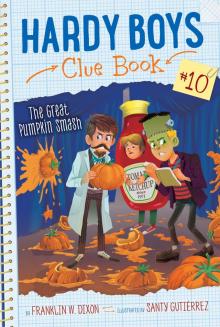 The Great Pumpkin Smash
The Great Pumpkin Smash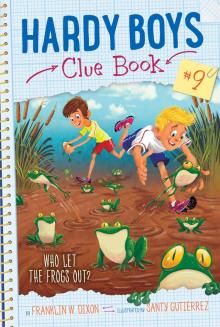 Who Let the Frogs Out?
Who Let the Frogs Out?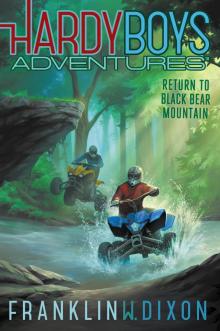 Return to Black Bear Mountain
Return to Black Bear Mountain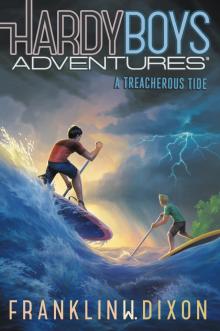 A Treacherous Tide
A Treacherous Tide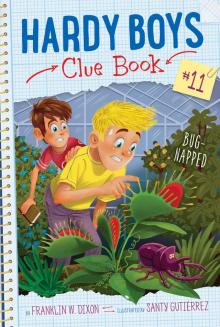 Bug-Napped
Bug-Napped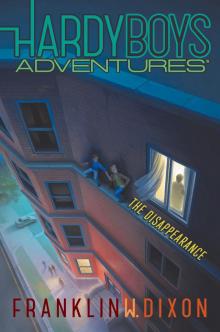 The Disappearance
The Disappearance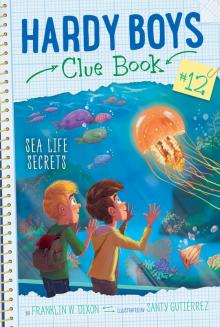 Sea Life Secrets
Sea Life Secrets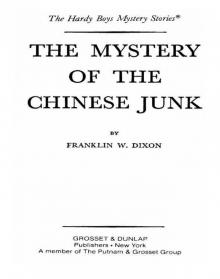 The Mystery of the Chinese Junk
The Mystery of the Chinese Junk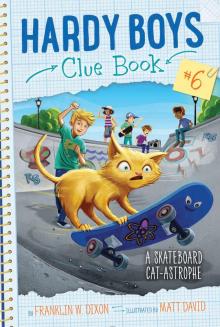 A Skateboard Cat-astrophe
A Skateboard Cat-astrophe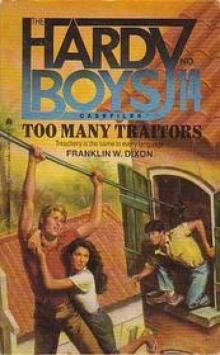 Too Many Traitors
Too Many Traitors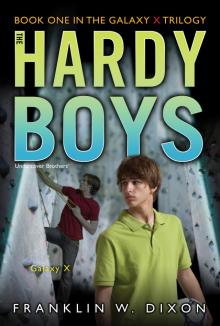 Galaxy X
Galaxy X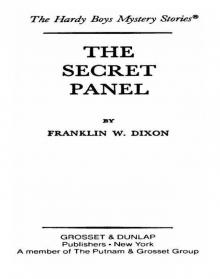 The Secret Panel
The Secret Panel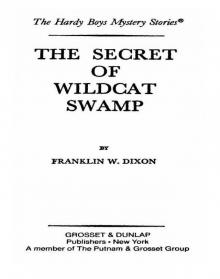 The Secret of Wildcat Swamp
The Secret of Wildcat Swamp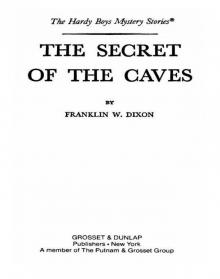 The Secret of the Caves
The Secret of the Caves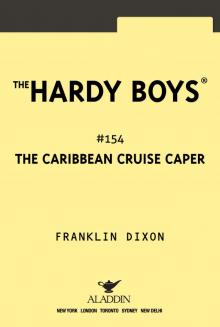 The Caribbean Cruise Caper
The Caribbean Cruise Caper Without a Trace
Without a Trace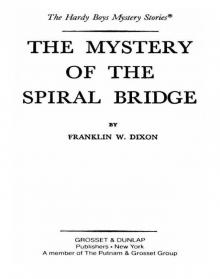 The Mystery of the Spiral Bridge
The Mystery of the Spiral Bridge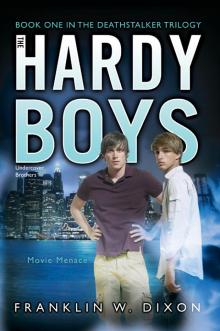 Movie Menace
Movie Menace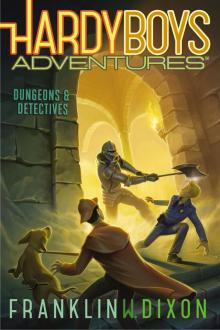 Dungeons & Detectives
Dungeons & Detectives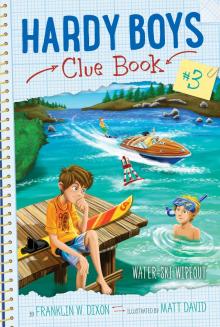 Water-Ski Wipeout
Water-Ski Wipeout The Case of the Psychic's Vision
The Case of the Psychic's Vision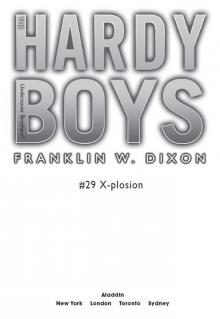 X-plosion
X-plosion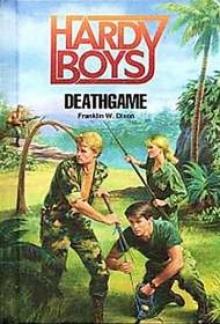 Deathgame
Deathgame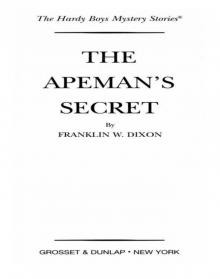 The Apeman's Secret
The Apeman's Secret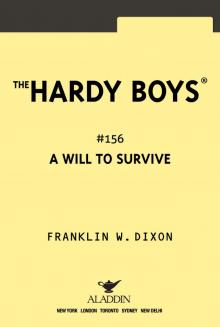 A Will to Survive
A Will to Survive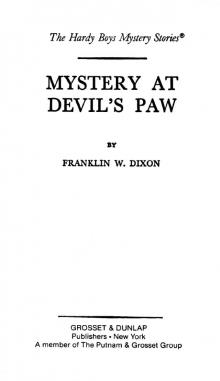 Mystery at Devil's Paw
Mystery at Devil's Paw Blood Money
Blood Money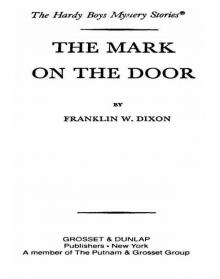 The Mark on the Door
The Mark on the Door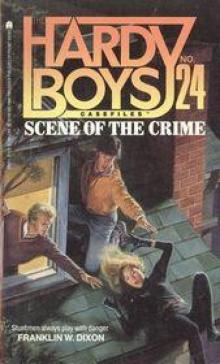 Scene of the Crime
Scene of the Crime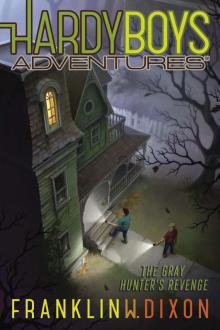 The Gray Hunter's Revenge
The Gray Hunter's Revenge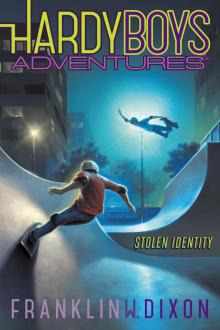 Stolen Identity
Stolen Identity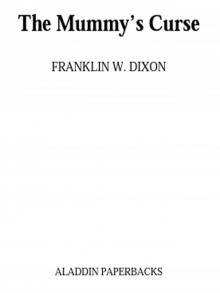 The Mummy's Curse
The Mummy's Curse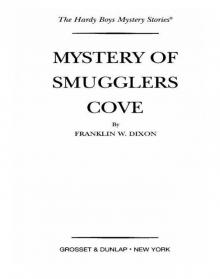 Mystery of Smugglers Cove
Mystery of Smugglers Cove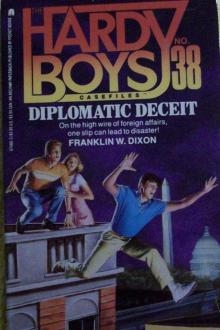 Diplomatic Deceit
Diplomatic Deceit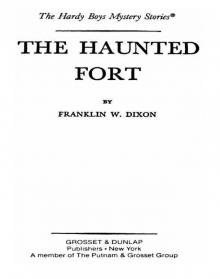 The Haunted Fort
The Haunted Fort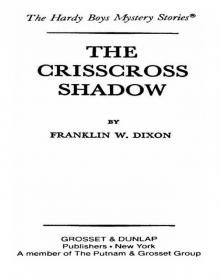 The Crisscross Shadow
The Crisscross Shadow Secret of the Red Arrow
Secret of the Red Arrow Trial and Terror
Trial and Terror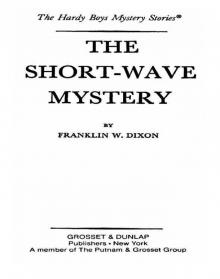 The Short-Wave Mystery
The Short-Wave Mystery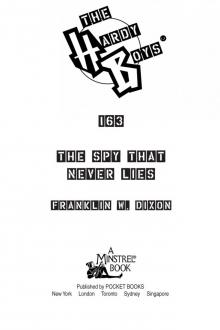 The Spy That Never Lies
The Spy That Never Lies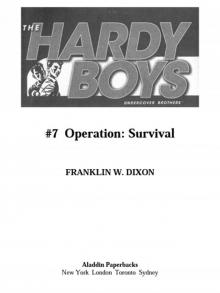 Operation: Survival
Operation: Survival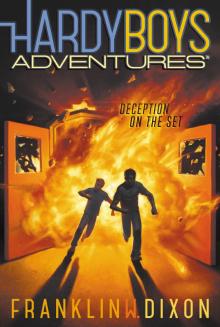 Deception on the Set
Deception on the Set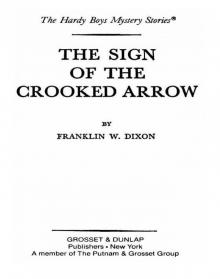 The Sign of the Crooked Arrow
The Sign of the Crooked Arrow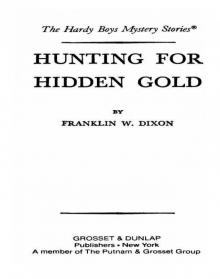 Hunting for Hidden Gold
Hunting for Hidden Gold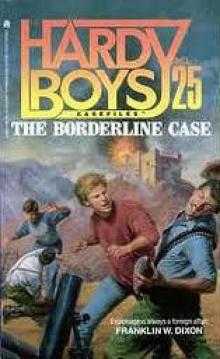 Disaster for Hire
Disaster for Hire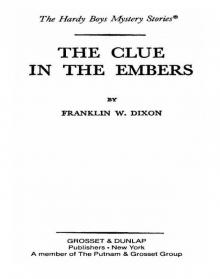 The Clue in the Embers
The Clue in the Embers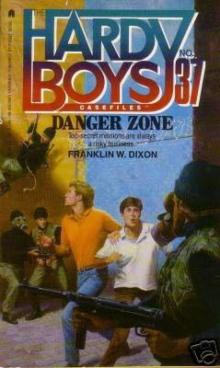 Danger Zone
Danger Zone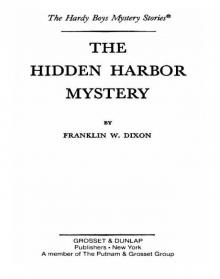 The Hidden Harbor Mystery
The Hidden Harbor Mystery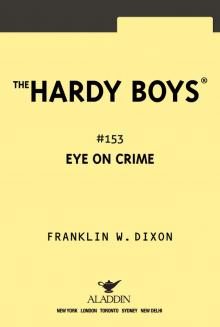 Eye on Crime
Eye on Crime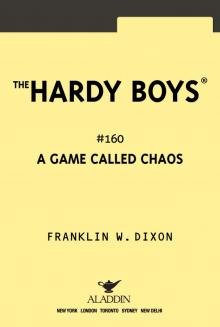 A Game Called Chaos
A Game Called Chaos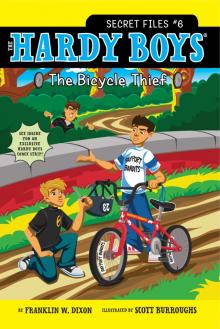 The Bicycle Thief
The Bicycle Thief The Missing Playbook
The Missing Playbook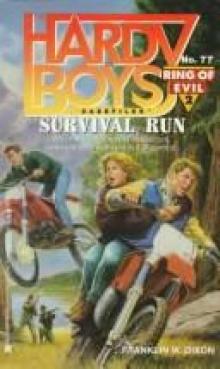 Survival Run
Survival Run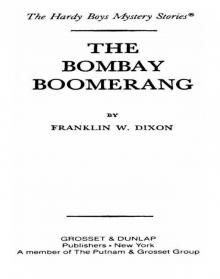 The Bombay Boomerang
The Bombay Boomerang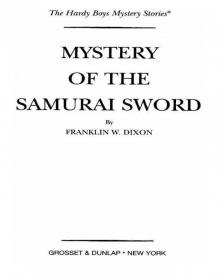 Mystery of the Samurai Sword
Mystery of the Samurai Sword Burned
Burned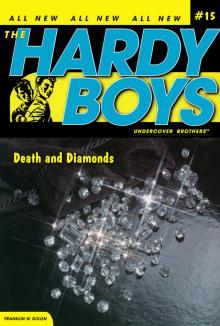 Death and Diamonds
Death and Diamonds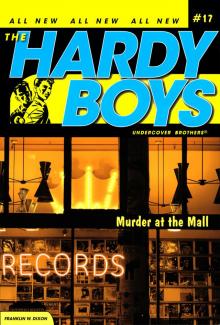 Murder at the Mall
Murder at the Mall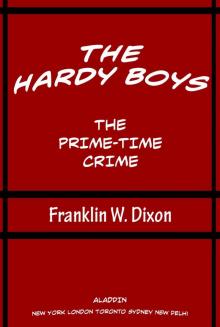 The Prime-Time Crime
The Prime-Time Crime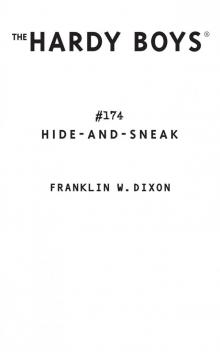 Hide-and-Sneak
Hide-and-Sneak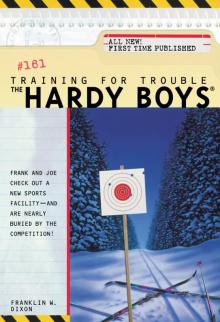 Training for Trouble
Training for Trouble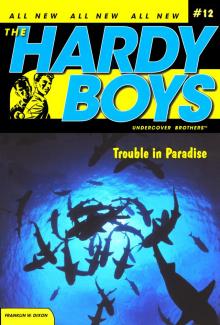 Trouble in Paradise
Trouble in Paradise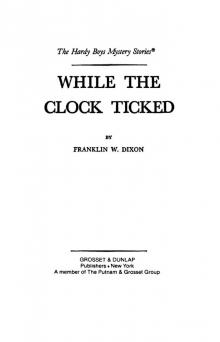 While the Clock Ticked
While the Clock Ticked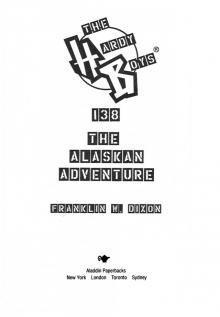 The Alaskan Adventure
The Alaskan Adventure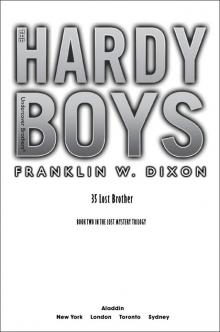 The Lost Brother
The Lost Brother Tunnel of Secrets
Tunnel of Secrets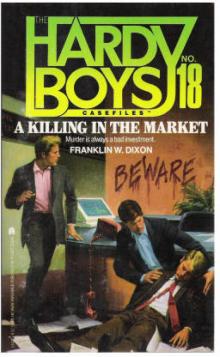 A Killing in the Market
A Killing in the Market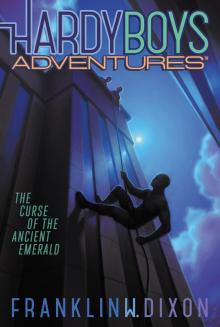 The Curse of the Ancient Emerald
The Curse of the Ancient Emerald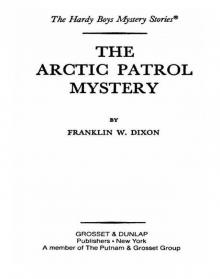 The Arctic Patrol Mystery
The Arctic Patrol Mystery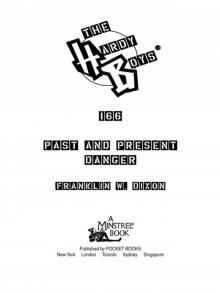 Past and Present Danger
Past and Present Danger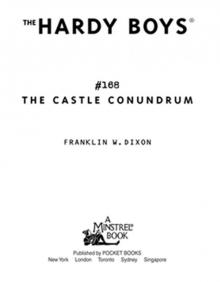 The Castle Conundrum (Hardy Boys)
The Castle Conundrum (Hardy Boys)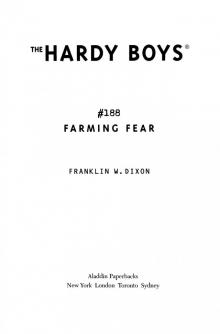 Farming Fear
Farming Fear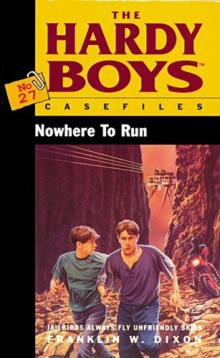 Nowhere to Run
Nowhere to Run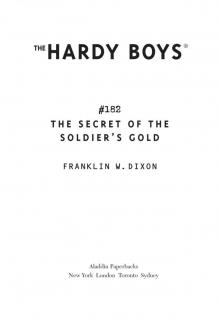 The Secret of the Soldier's Gold
The Secret of the Soldier's Gold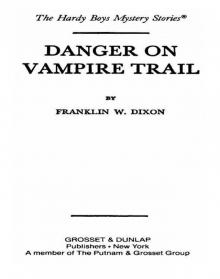 Danger on Vampire Trail
Danger on Vampire Trail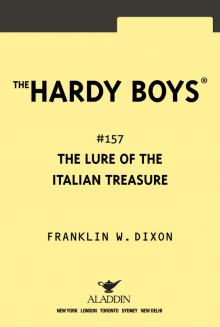 The Lure of the Italian Treasure
The Lure of the Italian Treasure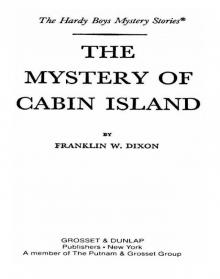 The Mystery of Cabin Island
The Mystery of Cabin Island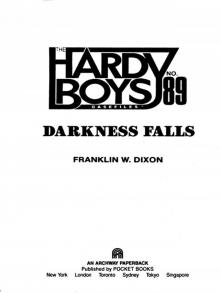 Darkness Falls
Darkness Falls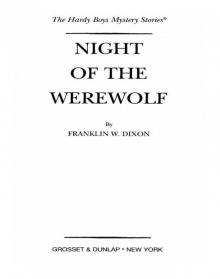 Night of the Werewolf
Night of the Werewolf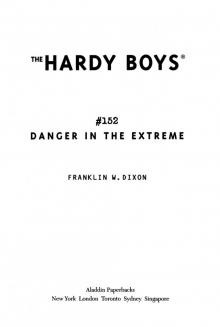 Danger in the Extreme
Danger in the Extreme The Lazarus Plot
The Lazarus Plot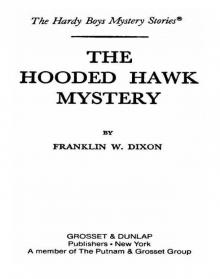 The Hooded Hawk Mystery
The Hooded Hawk Mystery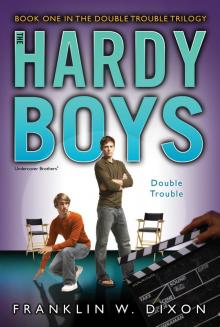 Double Trouble
Double Trouble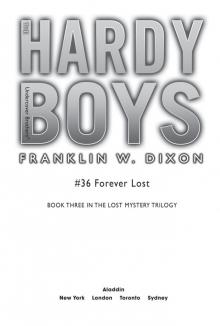 Forever Lost
Forever Lost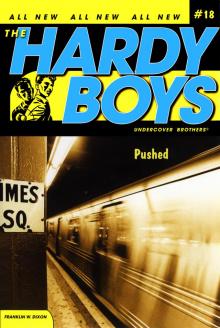 Pushed
Pushed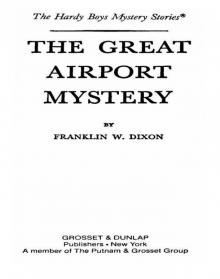 The Great Airport Mystery
The Great Airport Mystery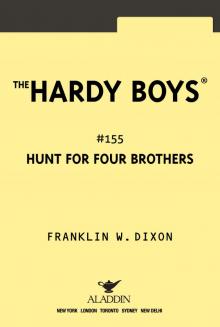 The Hunt for Four Brothers
The Hunt for Four Brothers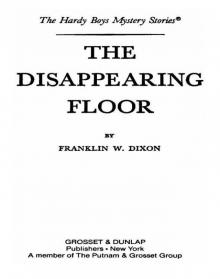 The Disappearing Floor
The Disappearing Floor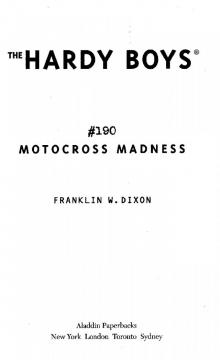 Motocross Madness
Motocross Madness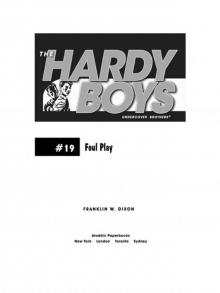 Foul Play
Foul Play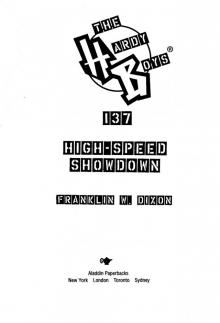 High-Speed Showdown
High-Speed Showdown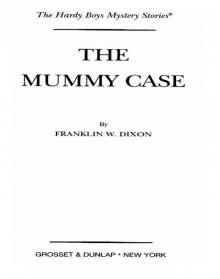 The Mummy Case
The Mummy Case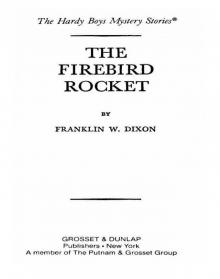 The Firebird Rocket
The Firebird Rocket Trouble in Warp Space
Trouble in Warp Space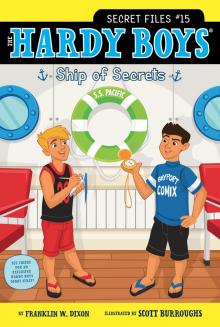 Ship of Secrets
Ship of Secrets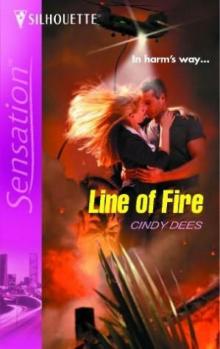 Line of Fire
Line of Fire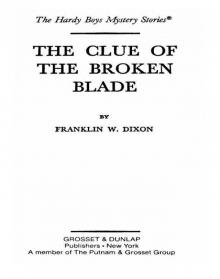 The Clue of the Broken Blade
The Clue of the Broken Blade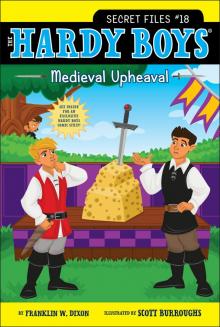 Medieval Upheaval
Medieval Upheaval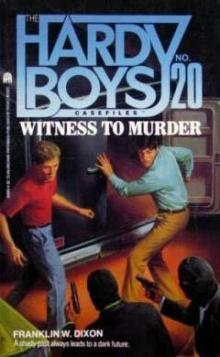 Witness to Murder
Witness to Murder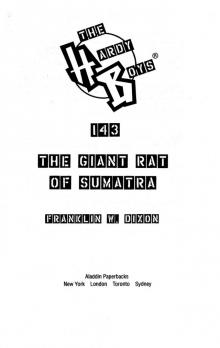 The Giant Rat of Sumatra
The Giant Rat of Sumatra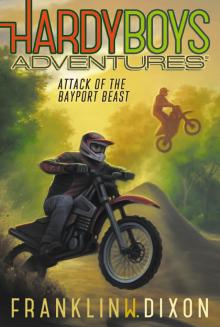 Attack of the Bayport Beast
Attack of the Bayport Beast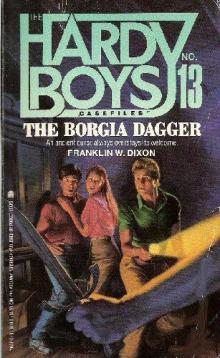 The Borgia Dagger
The Borgia Dagger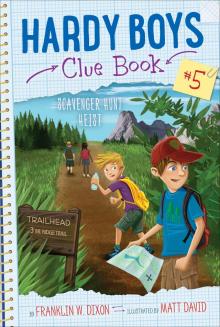 Scavenger Hunt Heist
Scavenger Hunt Heist No Way Out
No Way Out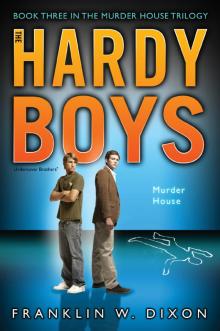 Murder House
Murder House The X-Factor
The X-Factor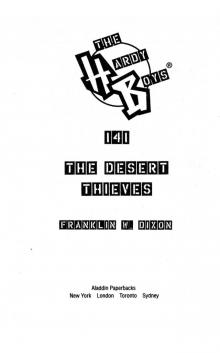 The Desert Thieves
The Desert Thieves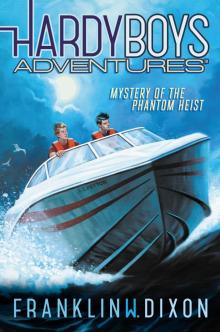 Mystery of the Phantom Heist
Mystery of the Phantom Heist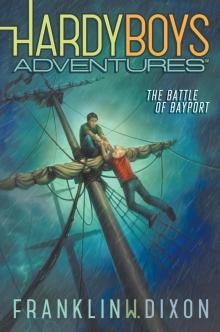 The Battle of Bayport
The Battle of Bayport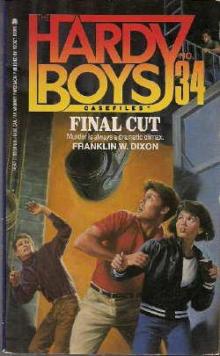 Final Cut
Final Cut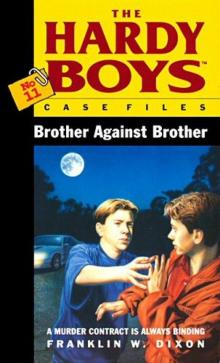 Brother Against Brother
Brother Against Brother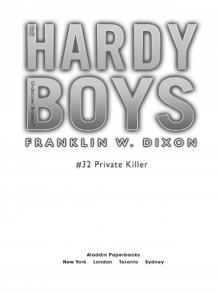 Private Killer
Private Killer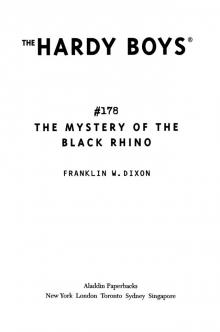 The Mystery of the Black Rhino
The Mystery of the Black Rhino Feeding Frenzy
Feeding Frenzy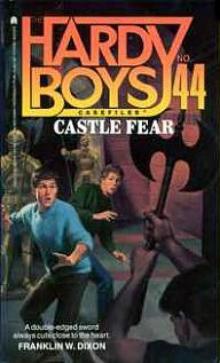 Castle Fear
Castle Fear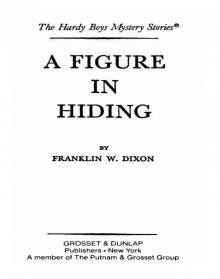 A Figure in Hiding
A Figure in Hiding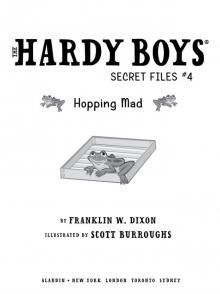 Hopping Mad
Hopping Mad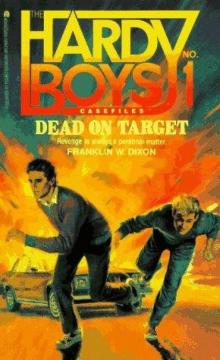 Dead on Target
Dead on Target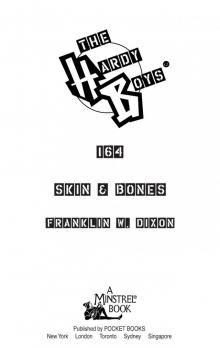 Skin and Bones
Skin and Bones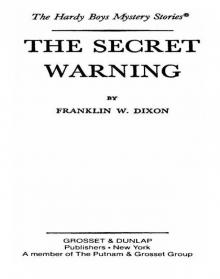 The Secret Warning
The Secret Warning Flesh and Blood
Flesh and Blood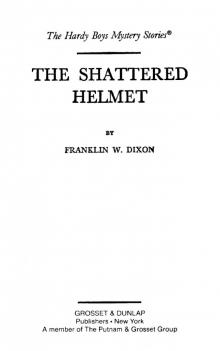 The Shattered Helmet
The Shattered Helmet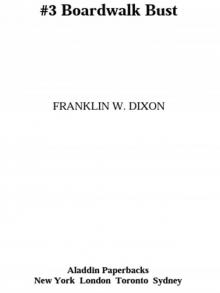 Boardwalk Bust
Boardwalk Bust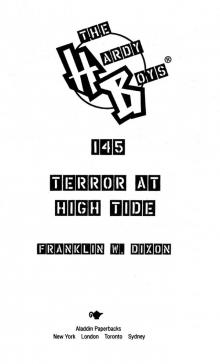 Terror at High Tide
Terror at High Tide In Plane Sight
In Plane Sight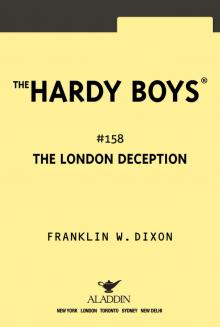 The London Deception
The London Deception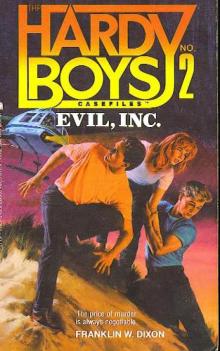 Evil, Inc.
Evil, Inc.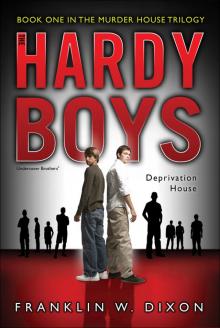 Deprivation House
Deprivation House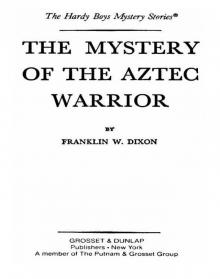 The Mystery of the Aztec Warrior
The Mystery of the Aztec Warrior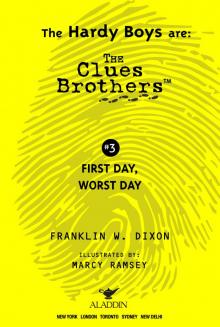 First Day, Worst Day
First Day, Worst Day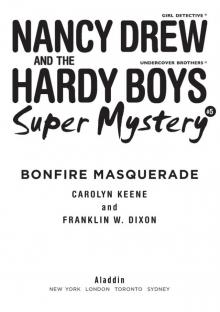 Bonfire Masquerade
Bonfire Masquerade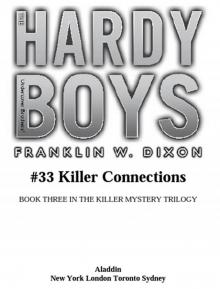 Killer Connections
Killer Connections Strategic Moves
Strategic Moves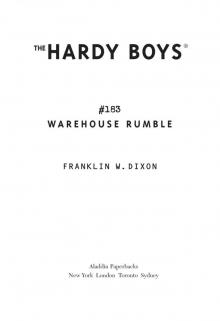 Warehouse Rumble
Warehouse Rumble The Chase for the Mystery Twister
The Chase for the Mystery Twister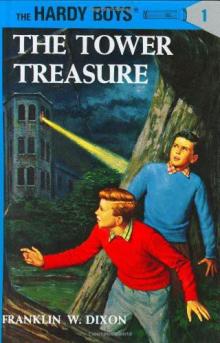 The Tower Treasure thb-1
The Tower Treasure thb-1 The Children of the Lost
The Children of the Lost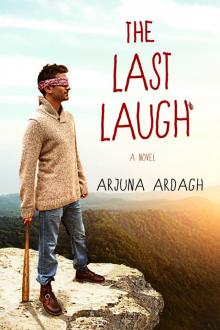 The Last Laugh
The Last Laugh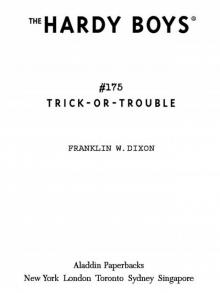 Trick-or-Trouble
Trick-or-Trouble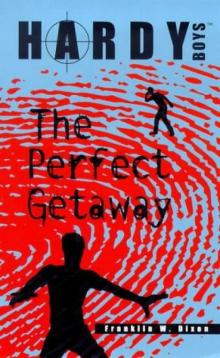 Perfect Getaway
Perfect Getaway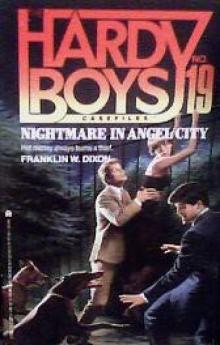 Nightmare in Angel City
Nightmare in Angel City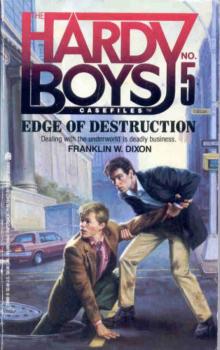 Edge of Destruction
Edge of Destruction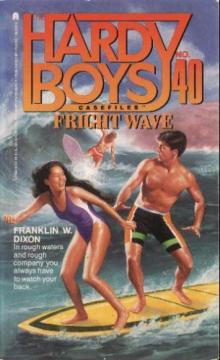 Fright Wave
Fright Wave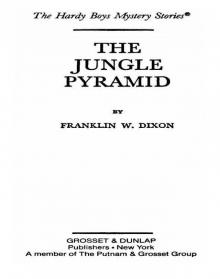 The Jungle Pyramid
The Jungle Pyramid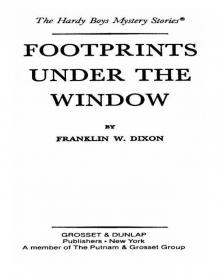 Footprints Under the Window
Footprints Under the Window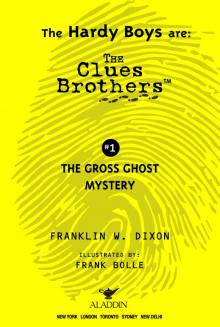 The Gross Ghost Mystery
The Gross Ghost Mystery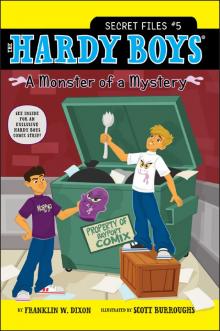 A Monster of a Mystery
A Monster of a Mystery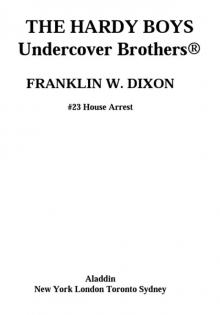 House Arrest
House Arrest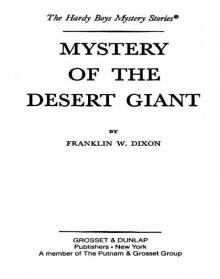 Mystery of the Desert Giant
Mystery of the Desert Giant Talent Show Tricks
Talent Show Tricks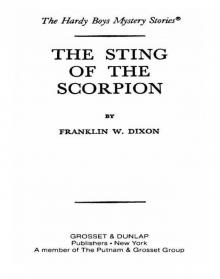 The Sting of the Scorpion
The Sting of the Scorpion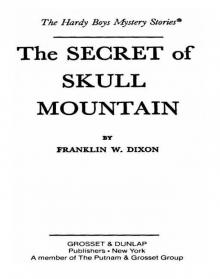 The Secret of Skull Mountain
The Secret of Skull Mountain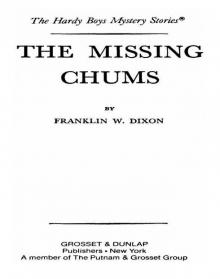 The Missing Chums
The Missing Chums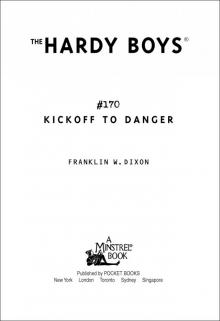 Kickoff to Danger
Kickoff to Danger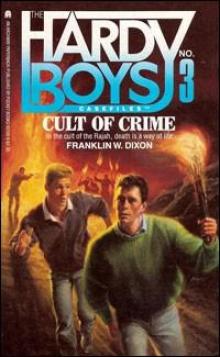 Cult of Crime
Cult of Crime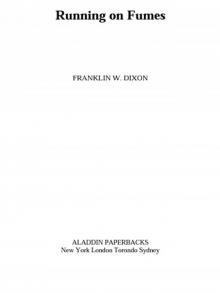 Running on Fumes
Running on Fumes Martial Law
Martial Law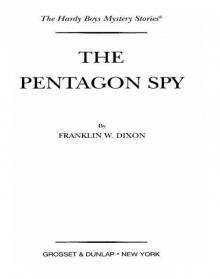 The Pentagon Spy
The Pentagon Spy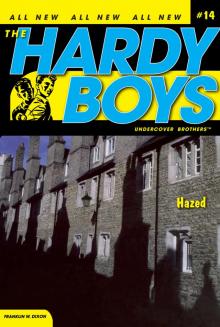 Hazed
Hazed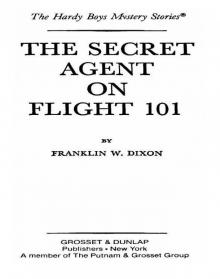 The Secret Agent on Flight 101
The Secret Agent on Flight 101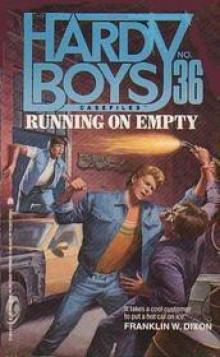 Running on Empty
Running on Empty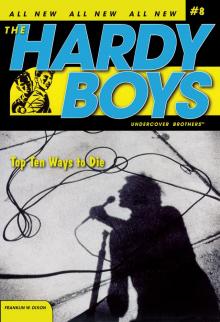 Top Ten Ways to Die
Top Ten Ways to Die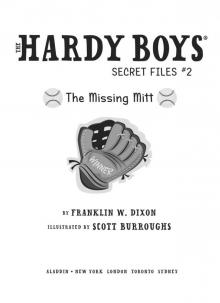 The Missing Mitt
The Missing Mitt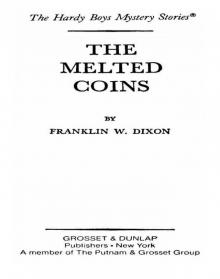 The Melted Coins
The Melted Coins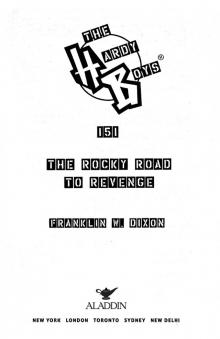 The Rocky Road to Revenge
The Rocky Road to Revenge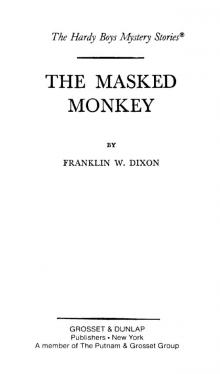 The Masked Monkey
The Masked Monkey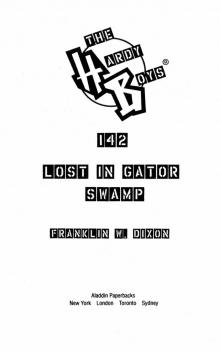 Lost in Gator Swamp
Lost in Gator Swamp Extreme Danger
Extreme Danger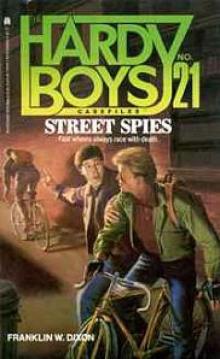 Street Spies
Street Spies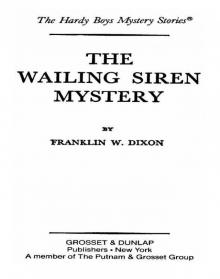 The Wailing Siren Mystery
The Wailing Siren Mystery The Dangerous Transmission
The Dangerous Transmission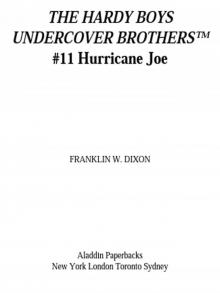 Hurricane Joe
Hurricane Joe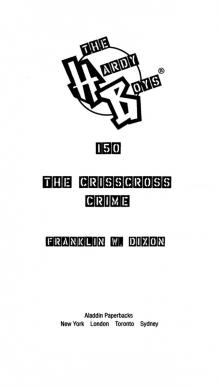 The Crisscross Crime
The Crisscross Crime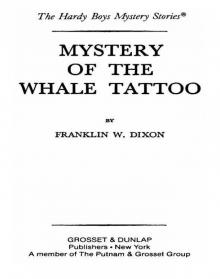 Mystery of the Whale Tattoo
Mystery of the Whale Tattoo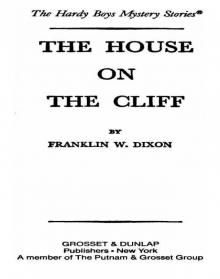 The House on the Cliff
The House on the Cliff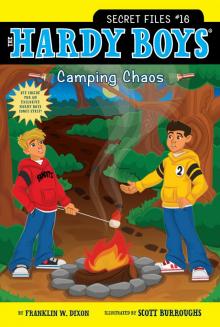 Camping Chaos
Camping Chaos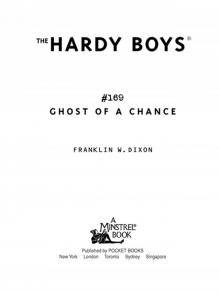 Ghost of a Chance
Ghost of a Chance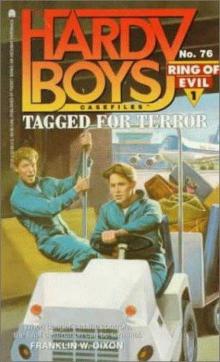 Tagged for Terror
Tagged for Terror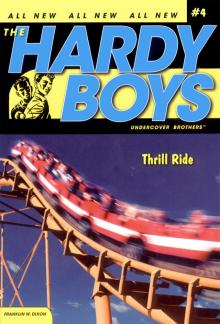 Thrill Ride
Thrill Ride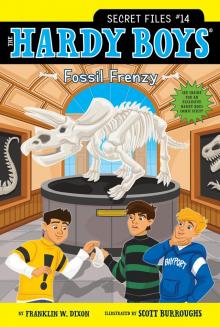 Fossil Frenzy
Fossil Frenzy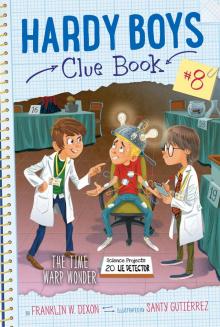 The Time Warp Wonder
The Time Warp Wonder Ghost Stories
Ghost Stories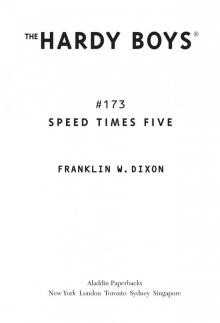 Speed Times Five
Speed Times Five What Happened at Midnight
What Happened at Midnight Three-Ring Terror
Three-Ring Terror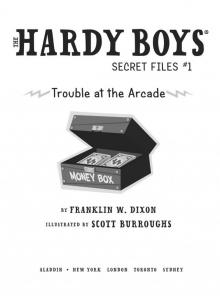 Trouble at the Arcade
Trouble at the Arcade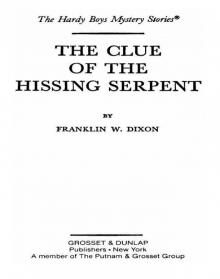 The Clue of the Hissing Serpent
The Clue of the Hissing Serpent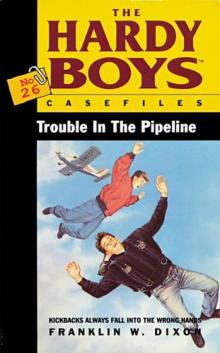 Trouble in the Pipeline
Trouble in the Pipeline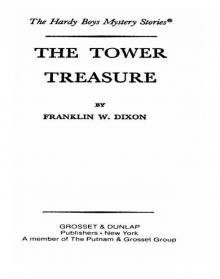 The Tower Treasure
The Tower Treasure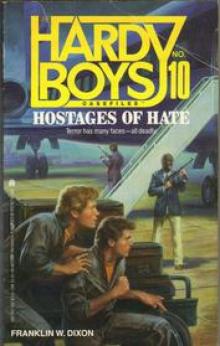 Hostages of Hate
Hostages of Hate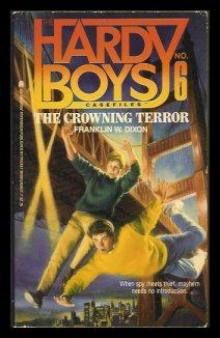 The Crowning Terror
The Crowning Terror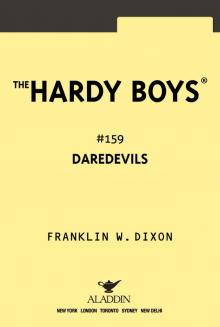 Daredevils
Daredevils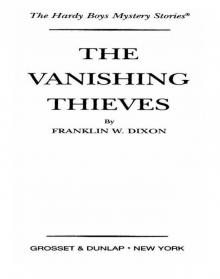 The Vanishing Thieves
The Vanishing Thieves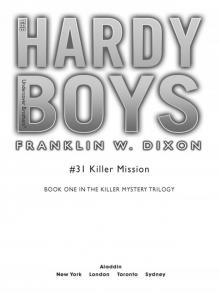 Killer Mission
Killer Mission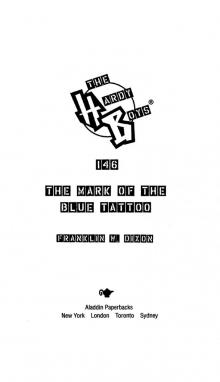 The Mark of the Blue Tattoo
The Mark of the Blue Tattoo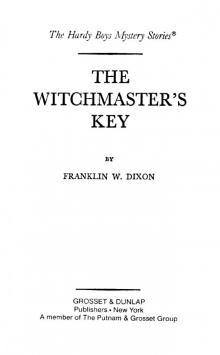 The Witchmaster's Key
The Witchmaster's Key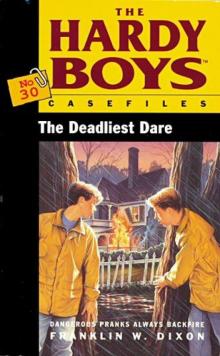 The Deadliest Dare
The Deadliest Dare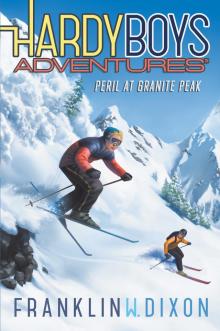 Peril at Granite Peak
Peril at Granite Peak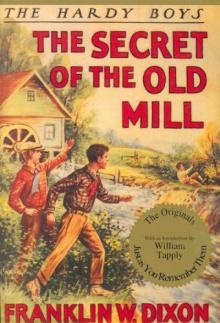 The Secret Of The Old Mill thb-3
The Secret Of The Old Mill thb-3 Rocky Road
Rocky Road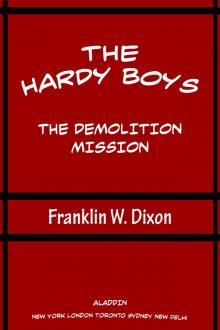 The Demolition Mission
The Demolition Mission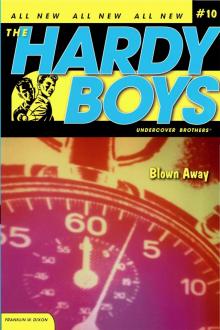 Blown Away
Blown Away Passport to Danger
Passport to Danger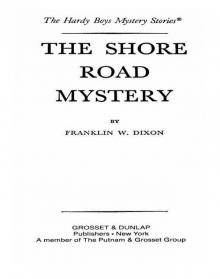 The Shore Road Mystery
The Shore Road Mystery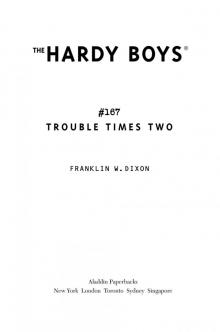 Trouble Times Two
Trouble Times Two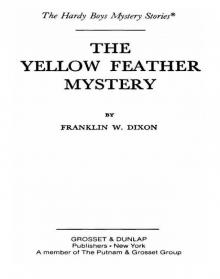 The Yellow Feather Mystery
The Yellow Feather Mystery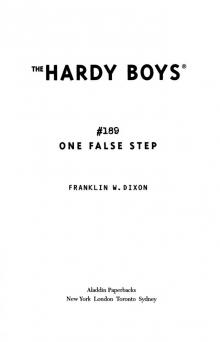 One False Step
One False Step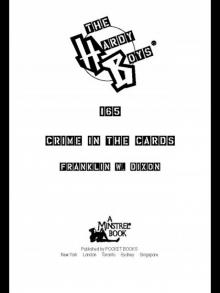 Crime in the Cards
Crime in the Cards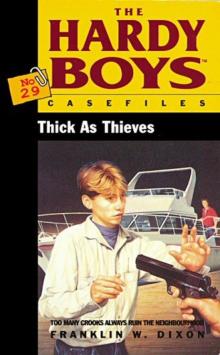 Thick as Thieves
Thick as Thieves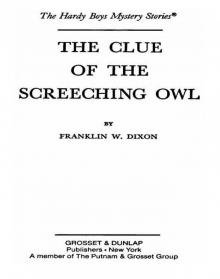 The Clue of the Screeching Owl
The Clue of the Screeching Owl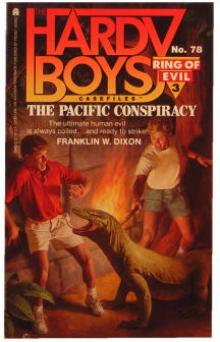 The Pacific Conspiracy
The Pacific Conspiracy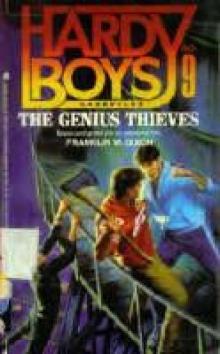 The Genius Thieves
The Genius Thieves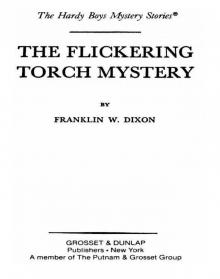 The Flickering Torch Mystery
The Flickering Torch Mystery Into Thin Air
Into Thin Air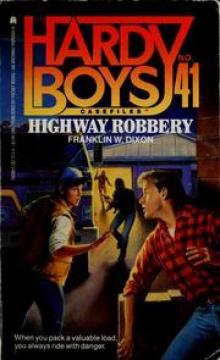 Highway Robbery
Highway Robbery Deadfall
Deadfall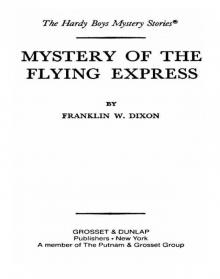 Mystery of the Flying Express
Mystery of the Flying Express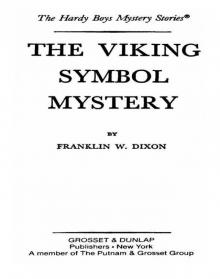 The Viking Symbol Mystery
The Viking Symbol Mystery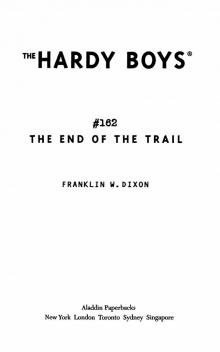 The End of the Trail
The End of the Trail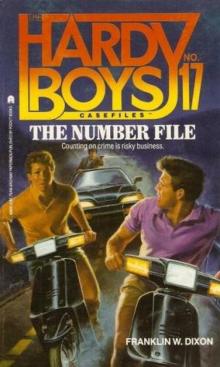 The Number File
The Number File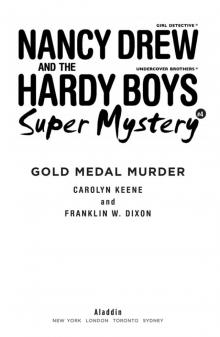 Gold Medal Murder
Gold Medal Murder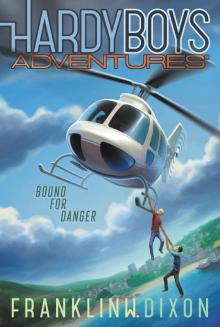 Bound for Danger
Bound for Danger Collision Course
Collision Course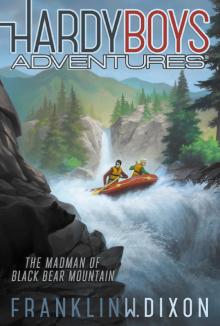 The Madman of Black Bear Mountain
The Madman of Black Bear Mountain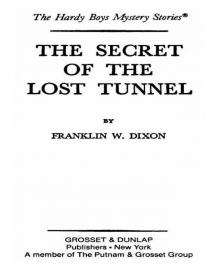 The Secret of the Lost Tunnel
The Secret of the Lost Tunnel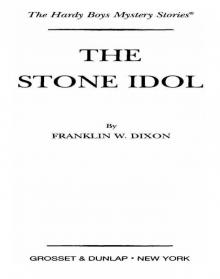 The Stone Idol
The Stone Idol The Secret of Pirates' Hill
The Secret of Pirates' Hill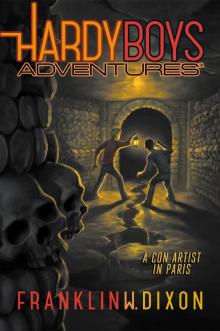 A Con Artist in Paris
A Con Artist in Paris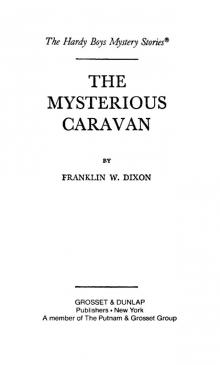 The Mysterious Caravan
The Mysterious Caravan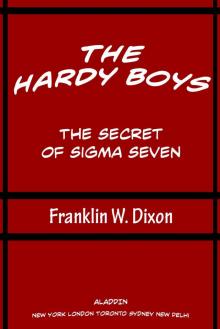 The Secret of Sigma Seven
The Secret of Sigma Seven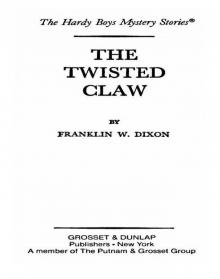 The Twisted Claw
The Twisted Claw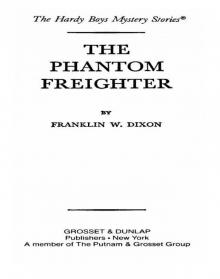 The Phantom Freighter
The Phantom Freighter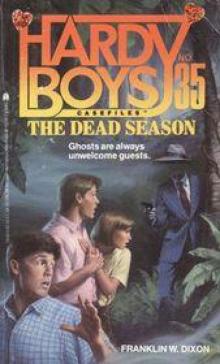 The Dead Season
The Dead Season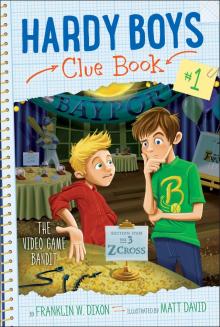 The Video Game Bandit
The Video Game Bandit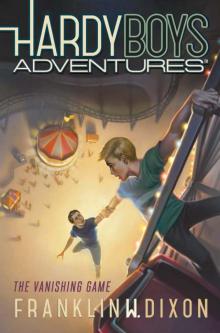 The Vanishing Game
The Vanishing Game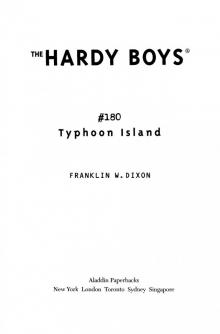 Typhoon Island
Typhoon Island